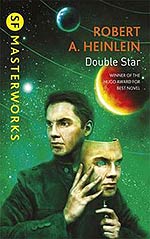
![]() spectru
spectru
2/25/2015
![]()
I like Heinlein. I've read several of his books; a couple are favorites and I disliked none. Double Star is a little different fromhis usual fare. It's in a science fiction setting, with folks traveling to Mars and to the Moon, but it really isn't so much a science fiction book, but rather, more of a lighthearted political intrigue. The multi-planetary nature of the book really isn't germane to the story. It reminds me very much of the movie Dave, in which a small town small businessman, a dead ringer for the president, is drafted to stand in for the president who has had a stroke.
Whenever an author writes things that happen in the future, he risks being dated because who can predict where technology goes? I found it amusing that the main character makes big use of something called Farley files, so named, he tells us, for a member of the Eisenhower administration from way back in the mid-twentieth century. Of course, that's when Double Star was written, and who can remember Farley?
A thing I thought was a little corny but perhaps very futuristic in the mid 50s: A spaceman's toast: he lifts his glass and says "Hot jets." Another anachronism from the 1950's is the use of a slide rule. Who can imagine using a slide rule today, much less in our space faring future? Amusing littel niggles.
The audiobook version of the book is read by Tom Weiner. His voice characterization of the narrator, Lawrence Smith,aka Lorenzo Smythe, aka The Great Lorenzo, sounds much more prissy or foppish in the beginning of the book than at the end. And that seems to fit with Smythe's character, who starts out seeming vain and priggish. As the book progresses he seems to become more talented and competent.
Fairly early in the book, space pilot Dak Broadbent turns the tables on a would-be Martian assassin. He addresses him with "I see You". The Martian returns the greeting, "I see you." In the context, it seems to mean I know and respect you, even though they are lethal adversaries. This form of greeting, "I see you" is used in the movie Avatar. The makers of Avatar must have gotten the phrase from Heinlein's 1956 novel.
The Martian's weapon is a light wand - could it be the model for the Star Wars light saber?
I could hardly classify this as a Great Book, but it is a very enjoyable read.